Federal Agriculture officials have moved to downplay concerns that forthcoming regulatory cost increases for Australia’s livestock export industry will be as high as some estimates claim, but have also stopped short of providing guarantees that future departmental charges will remain within currently modelled ranges.
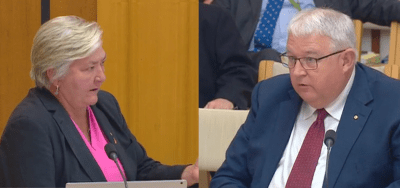 The cost recovery issue for livestock exports was a central focus of questions to senior Departmental figures during a Senate Rural and Regional Affairs and Transport Legislation Committee Estimates hearing in Canberra last night.
The cost recovery issue for livestock exports was a central focus of questions to senior Departmental figures during a Senate Rural and Regional Affairs and Transport Legislation Committee Estimates hearing in Canberra last night.
Mirroring comments made by Federal Agriculture Minister David Littleproud at Charters Towers last week, Departmental officials said their modelling shows departmental charge increases should not rise beyond $4-$5 per head of cattle to Indonesia and Vietnam within the next two years and by $7.12/head to Indonesia and $8.06/head to Vietnam by 2023-24.
Costs for sheep to the Middle East by sea are set to rise from 42c per sheep to $1.07 per sheep in 2021-22 and $1.75 per sheep when the Department moves to full cost recovery in 2023-24.
These rises reflect an increase from around 0.25 percent of the value of a consignment to 1.13 percent of the value of a consignment in 2023-24, deputy secretary David Hazlehurst told last night’s hearing.
Industry stakeholders have analysed figures contained in the Department’s Cost Recovery Impact Statement for livestock exports released in January and estimated that costs per head could increase by $16 to $20 a head, and even as high as $100 a head according to one estimate given at the Northern Territory Cattlemen’s Association conference earlier this year.
Departmental officials last night described those claims as “misinformation”, and said they were confident costs would not rise above the levels contained in their modelling.
They added that costs are not likely to rise to the extent they have modelled because work to modernise the Department’s systems are expected to deliver increased efficiencies and cost reductions in coming years.
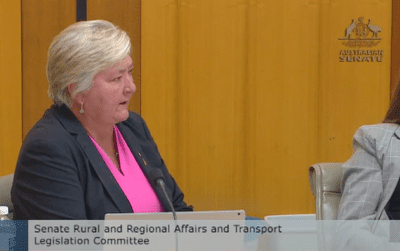
However when pressed by Northern Territory Senator Sam McMahon from the Country Liberal Party to guarantee that the Department’s charges will not rise above their modelled numbers, they declined to do so.
Department of Agriculture secretary Andrew Metcalfe said the modelling was based on real life situations and the department was “very confident the figures are in that zone”.
“But I think it is inappropriate for us to give an absolute guarantee because it depends on different variables as (deputy secretary) David, as Mr Hazlehurst has explained,” he said.
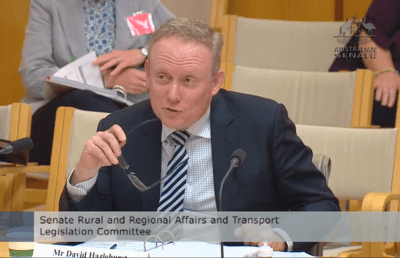
David Hazlehurst
Mr Metcalfe said department officials had been very clear on what the realistic figures would be, but the Senator responded by saying they had been as “clear as mud”.
“Industry needs some assurances,” she said. “Could those costs be higher than what the minister quoted in North Queensland – a yes or no answer?”
Mr Metcalfe: “I am very confident about what the minister said in North Queensland Senator.”
Senator McMahon: “Okay so you are not going to answer that question. Will all of the…”
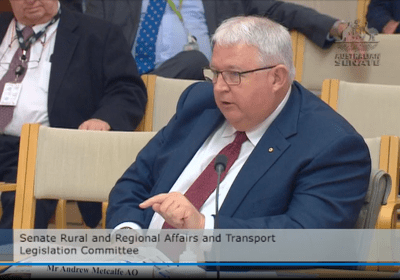
Andrew Metcalfe
Mr Metcalf: “Senator, with respect, can I say it would be quite inappropriate for people to go and speculate.
“We have been very clear here about the quantum of the cost being in the $5 to $7, $8 range, nowhere near the $100 that some people have been talking about.
“That is mischievous or ill-informed, I won’t ascribe motives to people, they no doubt are coming up with the best answers they could.
“We have been working very clearly and I am just not prepared to give an absolute guarantee because the world is a place where things change all the time.
“But I think we are being very clear about the fact we are working to reduce the costs in a constructive way and a transparent way and that the minister was very clear on what he said in Charters Towers.”
Senator McMahon: “I think the minister was very clear but I am not sure he was entirely correctly informed.”
Mr Metcalfe: “Senator can I take exception to the fact… the Department takes great pride in the quality of the work we provide to our ministers and I would just like to place on the record that I reject any assertion that we did not provide the correct and proper advice to the Minister.”
Senator McMahon asked if the Department would be releasing all of the calculations and assumptions upon which it has provided its advice on future charges, and was told the information would be provided on notice.
She said the industry “will take no comfort out of what you said today, when you cannot even give a simple yes or no answer to the question of could those costs be higher than $7.12c per head, they will take no comfort out of that whatsoever.”
“Well I am disappointed if people reach that conclusion Senator, I think I have said all I need to,” Mr Metcalfe replied.
Live export highest cost component
Under Federal Legislation the Department of Agriculture is required to recover all of the costs it incurs to regulate agricultural export industries through charges on exporters.
That applies to all export industries, but the livestock export industry now represents the highest cost component of the Department’s regulatory activities, the hearing was told.
Following a series of live export industry reviews (Moss, McCarthy, ASEL) since 2018 and recommendations which have increased the the level of regulation applied to the livestock export industry, the Department now has a total of 90 staff working in roles associated with livestock export regulation, the hearing was told.
The costs the department incurs to regulate the industry totalled $8 million 2018-19 but that will rise to over $23 million in 2023-24, according to projections in the Cost Recovery Impact Statement.
However Department officials say they expect efficiencies will mean actual charges will be lower than the projected costs by 2023-24.
Dept currently at 30pc cost recovery for livex
The hearing was told the Department currently recovers about 30 percent of the costs it incurs to regulate the livestock export sector from the industry itself, with the shortfall covered by taxpayers.
The Government is not seeking to recover the previously accumulated costs from industry, but is intending to move to full cost recovery from the industry by 2023-24.
The plan is to move from 30pc cost recovery this year to 64pc next year, 85 percent the following year and then 100pc in 2023-24.
The hearing was told that early figures indicated that mortality rates on export vessels are trending lower this year following the introduction of new stocking density levels under ASEL in November last year.
Initial data shows overall cattle mortality percentages decreased from 0.12pc from January to June 2020 to 0.10 percent from July to December 2020.
Sheep mortality percentages decreased from 0.24pc to 0.18pc.
‘I really want to understand on industry’s behalf where this money is going’
Senator Bridget McKenzie asked for more detail on the justification for the cost increases over coming years as projected by the Department.
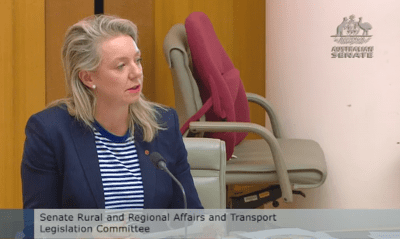
Senator Bridget McKenzie
“In 2017-18 the regulatory cost for live exports was approximately $8 million, compared to around $20 million this financial year,” she said.
“These increases as I note are attributed to implementing the many Moss review recommendations. Can I understand the direct result of the implementation of the Moss review recommendations and the consequent impact around animal welfare outcomes and how that is associated with the regulatory cost increase?” she asked.
DAWE First Assistant Secretary, Plant and Live Animal Exports, Dr Melissa McEwen said many years of under recovering costs meant there had not been funding to maintain areas such as “instructional material, training and capability for staff improvement, policies and procedures and so forth”.
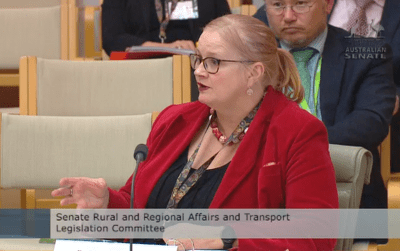
Dr Melissa McEwen
“That was one of the things that (the Moss review) particularly noted that we needed to improve a lot of things around instructional material, how we do our work, how we train people, so that has been one aspect,” she said.
The speeding up and finalising of the ASEL review and moving to more science based or more technically informed standards was another key area, she said.
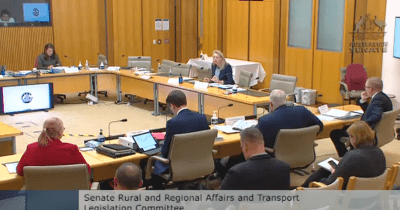
Senator McKenzie asked for a clearer “dollar for dollar” understanding on what the additional $12 million was being spent on – “much more detail than the three dot points” she said she received in response to a question on notice about the cost increases at the last Senate Estimates hearing.
“I really want to understand on industry’s behalf where this money is going, so what efficiency gains are you proposing given this represents a 300-400pc increase to the live export industry over 2-3 years from the $8m to the $20m?”
Dr McEwen said the Department has now done “a lot of the reform work” with the implementation of ASEL which was a recommendation of the Moss Review, which will now reduce to an ongoing yearly update process.
“That is going to be much less onerous for example than building the bridge in the first place, painting it and keeping it in place is much more simple, the same with much of our policy and procedure work.”
Asked by Senator McKenzie if the Department envisages that impost going down over time, Mr Metcalfe said that “having had this period of investment, we are now certainly working toward how we can reduce cost”.
Assumptions underpinning modelling will be publicly released
She also asked if the Department was planning to release the assumptions underpinning its modelling of projected costs, suggesting that the modelling at present isn’t transparent, which explained why some were coming up with assumptions of big cost increases.
Mr Hazlehurst said the department had been “very transparent about all of our work”.
“Okay, so where are the assumptions?” Senator McKenzie asked.
“We have taken industry through the modelling last week and we’re happy to provide that modelling to the committee,” Mr Hazlehurst replied.
Senator McKenzie: “But is it public?”
Mr Hazlehurst: “Not yet. It will be when we provide it to the committee.”
Senator McKenzie: “Yes, thanks to senators’ questioning it will be.”



HAVE YOUR SAY